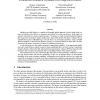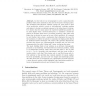294 search results - page 46 / 59 » The complexity of computing a Nash equilibrium |
122
click to vote
SIGECOM
2008
ACM
15 years 1 months ago
2008
ACM
We study the question of how to easily recognize whether a social unction f from an abstract type space to a set of outcomes is truthful, i.e. implementable by a truthful mechanis...
ATAL
2008
Springer
15 years 3 months ago
2008
Springer
We demonstrate two game theory-based programs for headsup limit and no-limit Texas Hold'em poker. The first player, GS3, is designed for playing limit Texas Hold'em, in ...
111
click to vote
SIGECOM
2009
ACM
15 years 8 months ago
2009
ACM
We study the relationship between the social cost of correlated equilibria and the social cost of Nash equilibria. In contrast to previous work focusing on the possible benefits ...
108
click to vote
PODC
2009
ACM
16 years 2 months ago
2009
ACM
Imitating successful behavior is a natural and frequently applied approach to trust in when facing scenarios for which we have little or no experience upon which we can base our d...
105
click to vote
CRYPTO
2000
Springer
15 years 5 months ago
2000
Springer
In this work we use cryptography to solve a game-theoretic problem which arises naturally in the area of two party strategic games. The standard game-theoretic solution concept for...




